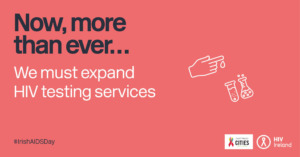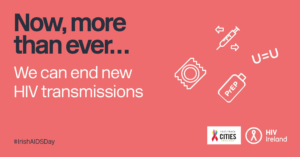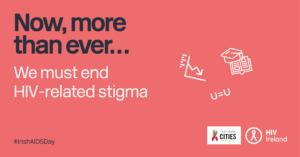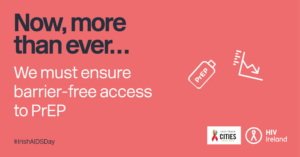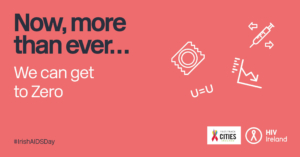Now, more than ever… We must end HIV and HIV-related Stigma
Priorities
To coincide with Irish AIDS Day 2020, HIV Ireland is launching “Now, more than ever…”, a set of priorities to highlight the urgent need to end HIV and HIV-related stigma through planning and investment in key HIV prevention measures.
Now, more than ever…
- We must expand HIV testing services.
- We can end new HIV transmissions.
- We must end HIV-related stigma.
- We must ensure barrier-free access to PrEP.
- We can get to Zero.
HIV and COVID-19
This year, Irish AIDS Day coincides with the national response to an extraordinary global public health emergency – COVID-19.
Efforts to suppress the spread of the SARS-COV-2 virus which causes COVID-19 include widespread testing, isolating active or potential cases, social distancing, restrictions on travel, the closure of schools and businesses, and the redeployment of clinical and other community-based staff to frontline health services.
As a result of these and other measures, the number of active COVID-19 cases continues to fall enabling Government plans to relax restrictions and re-open society to move forward.
Impact on HIV and Sexual Health Services
The impact of these measures on the provision of existing HIV and Sexual Health services, particularly in relation to community-based services, has also been severe.
The disruption to services has meant reduced capacity and availability of many services ordinarily available to prevent onward transmission of HIV and other STIs. This includes the suspension of local access to comprehensive HIV and STI screening services, community-based rapid HIV testing, new entry to the national programme for PrEP (Pre-Exposure Prophylaxis), and a reduction in HIV and STI prevention education and training.
Working with sexual health services around the country and with the support of the Gay Health Network and HSE Sexual Health and Crisis Pregnancy Programme, HIV Ireland has documented the ongoing availability or reduction of services. Information on the current operational status of HIV and Sexual Health services throughout the country is available here.
More information on HIV and COVID 19 is available here.
HIV Ireland recommends that these priorities be reflected in any new Programme for Government agreed in 2020. Now, more than ever we must end HIV and HIV-related stigma.
Read our Press Release for Irish AIDS Day 2020.
Now, more than ever…We must expand HIV testing services.
Prior to the imposition of restrictions on the availability of clinical and community based-services during the response to COVID-19, numbers of newly notified cases of HIV in Ireland continued to rise.
Provisional data for 2019 from the Health Protection Surveillance Centre has seen the highest recorded number of newly notified HIV cases in Ireland, rising for the third year in a row. Last year, 536 newly notified cases of HIV were recorded with the rate of notification rising to 11.4 per 100,000 of the population, the highest rate on record.
Following the advent of COVID-19, there has been a very significant reduction in testing for asymptomatic cases of HIV.
Widespread availability of testing, particularly among populations with higher rates of undiagnosed HIV, significantly improves detection rates, increases the numbers of people on effective treatment, and reduces onward transmission.
More information on HPSC data on newly notified cases of HIV is available here.
Now, more than ever…We can end new HIV transmissions.
Ireland currently has all the prevention tools required to end new HIV transmissions in line with commitments made by Government. Targeted resources aimed at increasing awareness and availability of preventive measures must include:
- Increasing access to clinical and community-based testing at a local level to identify and ensure effective treatment of new cases of HIV;
- Rollout and widespread uptake of a national PrEP programme;
- Increased awareness and use of condoms during sex;
- Increase provision of safer injecting facilities at community level;
- Barrier-free access to emergency Post Exposure Prophylaxis (PEP);
- Increased knowledge and awareness of the U=U message (undetectable equals untransmittable).
More information on HIV prevention measures is available here.
Now, more than ever…We must end HIV-related stigma.
Stigma associated with HIV not only diminishes the quality of life of the person living with HIV but also impacts on their treatment outcomes and increases the risk of HIV transmission among the rest of the population. These are the key findings from the 2017 National HIV Knowledge and Attitudes Survey and the People Living with HIV Stigma Survey 2017.
While stigma is most sorely felt by the person experiencing stigma, society at large is not immune from the negative effects resulting from HIV-related stigma.
Concrete measures, smart investment and increased resources to combat HIV-related stigma, must be included as part of any national framework or strategy on HIV and/or sexual health going forward to ensure that people living with HIV live free from stigma and discrimination, and that stigma is not a barrier to HIV prevention.
More information about HIV-related stigma is available here.
Now, more than ever…We must ensure barrier-free access to PrEP.
The onset of COVID-19 has seen access to the national rollout of the PrEP (Pre-Exposure Prophylaxis) programme limited and, in some cases, closed to new entrants. (See updated information on services here.)
Measures to ensure that there is no further interruption in access to PrEP for anyone living in Ireland and who is eligible to receive PrEP, including during any planned re-imposition of emergency public health measures, should be put in place.
More information on the planned availability and eligibility criteria for PrEP is available here.
Now, more than ever…We can get to Zero.
In 2019, Taoiseach Leo Varadkar TD, Health Minister Simon Harris TD, and Minister for State for Health Promotion Catherine Byrne TD, together with the Mayors from Ireland’s four largest cities signed up to the global HIV initiative, Fast-Track Cities, aimed at boosting HIV prevention and treatment, and reducing HIV-related stigma.
As part of the initiative, €450K was pledged to fund activities, including an expected target of 3,250 community-based rapid HIV tests targeting groups disproportionately affected by HIV.
In light of increasing numbers of newly notified cases of HIV, and the impact of the restrictions to services during COVID-19, measures to expand HIV testing, promote prevention and invest in locally accessible HIV and Sexual Health services are now required if Ireland is to have any meaningful chance to meet the targets set out in Fast-Track Cities and the UN Sustainable Development Goals to get to zero new HIV transmissions by 2030.
More information on Fast Track Cities 90-90-90 targets are available here.
More information on the Sustainable Development Goals are available here.

